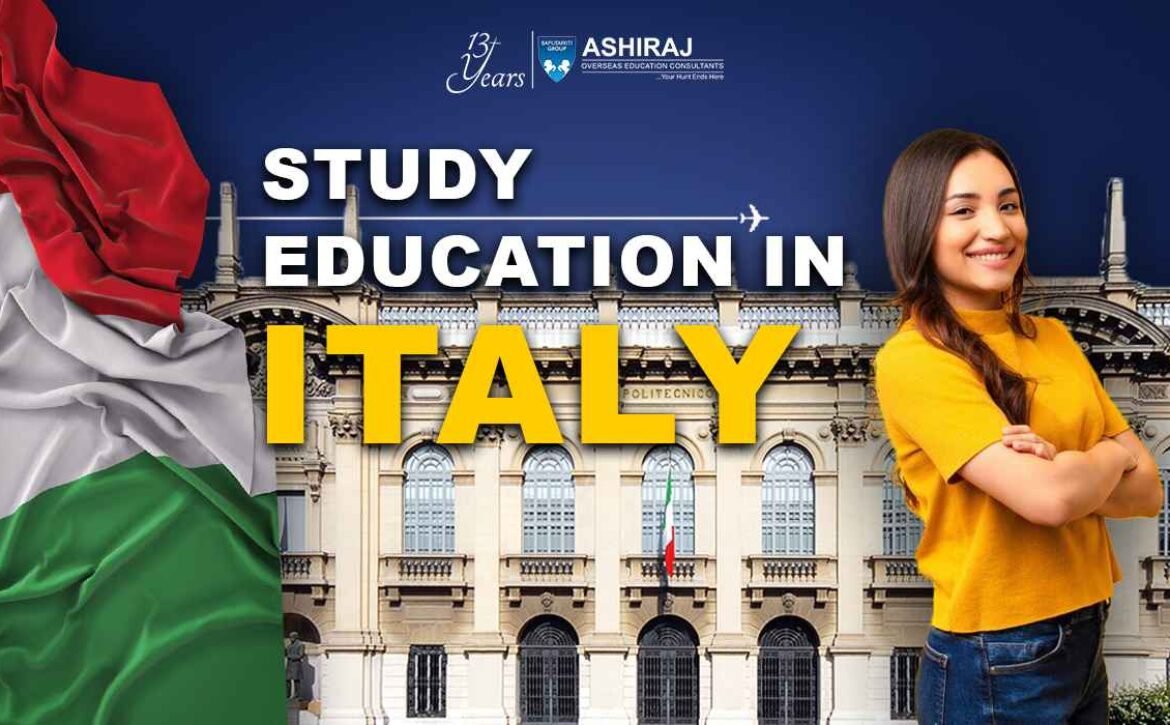
Education in Italy
Education in Italy is deeply rooted in the nation’s rich cultural heritage and commitment to academic excellence. With a history dating back to the Middle Ages, Italy boasts a long-standing tradition of fostering intellectual growth and innovation. From the renowned universities of Bologna and Padua, which were instrumental in shaping modern higher education, to contemporary institutions spread across the country, Italy offers a diverse array of educational opportunities.
In Italy, education is highly valued, with a strong emphasis on both theoretical knowledge and practical skills development. From primary education to tertiary institutions, the Italian education system strives to equip students with the tools they need to succeed in an increasingly globalized and technologically driven world. With a focus on disciplines ranging from engineering and computer science to the humanities and arts, Education in Italy is characterized by its adaptability and commitment to nurturing well-rounded individuals equipped to tackle the challenges of the 21st century.
Why to Study Education in Italy?
- Rich Cultural Heritage: Italy’s education system is deeply intertwined with its rich cultural history, offering students a unique opportunity to immerse themselves in a country renowned for its art, literature, and architecture.
- Academic Excellence: Renowned for its prestigious universities and high academic standards, studying in Italy ensures access to top-quality education recognized worldwide.
- Diverse Educational Opportunities: From ancient universities like Bologna to modern institutions scattered across the country, Italy offers a diverse range of educational experiences catering to various interests and career paths.
- Innovative Teaching Methods: Italian universities are known for their innovative teaching approaches, combining traditional methods with modern technologies to provide students with a dynamic learning environment.
- Affordable Education: Compared to other European countries and the United States, tuition fees in Italy are relatively affordable, making it an attractive option for international students seeking quality education without breaking the bank.
- Cultural Immersion: Studying in Italy offers more than just academic enrichment; it provides an opportunity to immerse oneself in Italian culture, language, and way of life, fostering personal growth and intercultural understanding.
- Gateway to Europe: Situated at the crossroads of Europe, Italy serves as a gateway to the continent, offering students easy access to travel and explore neighboring countries, further enriching their educational experience.
Top Universities to Study Education in Italy
University | QS World University Ranking 2023 | Type of University | Average Annual Fees | Programs Offered |
University of Bologna | 75 | Public | €2,000-€4,000 | Arts, Humanities, Sciences, Engineering |
Sapienza University of Rome | 120 | Public | €1,500-€3,000 | Medicine, Engineering, Social Sciences |
Politecnico di Milano | 150 | Public | €2,500-€5,000 | Engineering, Architecture, Design |
University of Milan | 200 | Public | €2,000-€3,500 | Law, Economics, Medicine, Humanities |
University of Padua | 250 | Public | €2,000-€4,000 | Arts, Sciences, Medicine, Engineering |
- University of Bologna: Ranked 75th globally, it offers a wide range of programs in arts, humanities, sciences, and engineering with average annual fees ranging from €2,000 to €4,000.
- Sapienza University of Rome: Ranked 120th globally, it provides programs in medicine, engineering, and social sciences with average annual fees ranging from €1,500 to €3,000.
- Politecnico di Milano: Ranked 150th globally, it specializes in engineering, architecture, and design with average annual fees ranging from €2,500 to €5,000.
- University of Milan: Ranked 200th globally, it offers programs in law, economics, medicine, and humanities with average annual fees ranging from €2,000 to €3,500.
- University of Padua: Ranked 250th globally, it offers programs in arts, sciences, medicine, and engineering with average annual fees ranging from €2,000 to €4,000.
Course Curriculum for Education in Italy
- Interdisciplinary Approach: Education in Italy emphasizes an interdisciplinary approach, integrating various subjects to provide students with a holistic understanding of their field of study, promoting critical thinking and problem-solving skills.
- Practical Learning: The curriculum often includes hands-on learning experiences, such as internships, laboratory work, and field studies, allowing students to apply theoretical knowledge to real-world situations and gain practical skills relevant to their future careers.
- Cultural Studies: Given Italy’s rich cultural heritage, education in Italy often incorporates studies in art, literature, history, and philosophy, enabling students to appreciate and understand the cultural context in which they live and work.
- Language Proficiency: Language proficiency is a key component of the curriculum, with a strong emphasis on mastering the Italian language, as well as opportunities to learn other languages, enhancing students’ communication skills and opening doors to international opportunities.
- Research and Innovation: Education in Italy fosters a culture of research and innovation, encouraging students to engage in independent research projects and collaborate with faculty members on cutting-edge research initiatives, preparing them for leadership roles in their respective fields.
Eligibility Criteria & Admission Requirements for MS in Education in Italy
- Language Proficiency: Applicants are required to demonstrate proficiency in either IELTS or TOEFL. Minimum scores for IELTS are 6.5 overall, while for TOEFL, a minimum score of 90 is typically required.
- Standardized Tests: Depending on the program, applicants may need to submit scores for either GRE or GMAT. For GRE, a competitive score would be around 310, while for GMAT, a score above 600 is considered favorable.
- Academic Credentials: Applicants must provide certified copies of their academic certificates, including transcripts and diplomas, demonstrating completion of previous education requirements.
- Work Experience: Some programs may require or prefer applicants to have relevant work experience in the field. Candidates are encouraged to include details of any relevant professional experience in their application.
- Passport & Student Visa: International applicants must possess a valid passport and obtain a student visa to study in Italy. It’s essential to check the specific visa requirements and procedures for their country of origin.
Test | Minimum Score |
IELTS | 6.5 |
TOEFL | 90 |
GRE | 310 |
GMAT | 600 |
Completing the eligibility criteria ensures that applicants meet the necessary qualifications for admission to educational programs in Italy, facilitating a smooth transition into their chosen academic pursuits.
Documents Required for Studying Education in Italy
- Passport: A valid passport is essential for international students applying to study in Italy, serving as proof of identity and nationality.
- Letters of Recommendation (LOR): Typically, two letters of recommendation from teachers or professionals familiar with the applicant’s academic or professional background are required.
- Statement of Purpose (SOP): An SOP outlining the applicant’s academic and career goals, as well as reasons for choosing the specific program and institution, is necessary.
- Curriculum Vitae (CV): A detailed resume highlighting academic achievements, work experience, extracurricular activities, and relevant skills is required.
- Official High School Transcripts: Certified copies of official high school transcripts detailing the applicant’s academic performance are necessary.
- Educational Certificates: Copies of educational certificates, such as diplomas or degrees earned, must be provided as proof of academic qualifications.
- Work Experience Certificate: If applicable, a work experience certificate validating any relevant professional experience is required.
- Proof of Financial Resources: Evidence of sufficient financial resources to cover tuition fees, living expenses, and other costs associated with studying in Italy is necessary for visa application and enrollment.
Ensuring all required documents are complete and submitted on time is crucial for a smooth application process and successful admission to educational programs in Italy.
Admission Process for Education in Italy
- Research and Choose: Research various universities and programs in Italy, considering factors such as academic reputation, course offerings, and location, and choose the one that best aligns with your academic and career goals.
- Check Eligibility: Review the eligibility criteria for your chosen program, including academic requirements, language proficiency tests (IELTS or TOEFL), and standardized tests (GRE or GMAT).
- Gather Documents: Collect all required documents, including academic transcripts, letters of recommendation, statement of purpose, curriculum vitae, passport, and proof of financial resources.
- Submit Application: Complete the online application form for your selected program and university, ensuring that all required information and documents are accurately provided.
- Pay Application Fee: Pay the application fee, if applicable, as per the university’s instructions, to finalize your application submission.
- Wait for Decision: Wait for the university to review your application. This process may take several weeks, so be patient.
- Receive Admission Offer: If your application is successful, you will receive an admission offer from the university. Review the offer carefully and follow the instructions provided.
- Accept Offer and Secure Visa: Accept the admission offer by the deadline specified and begin the process of securing a student visa to study in Italy.
- Enroll and Prepare: Once your visa is approved, enroll in your chosen program, make necessary arrangements for accommodation and travel, and prepare for your educational journey in Italy.
Following these steps diligently ensures a smooth admission process and sets you on the path towards pursuing education in Italy.
“Education is the most powerful weapon which you can use to change the world.”
Nelson Mandela
Cost of Education Course in Italy
- Tuition Fees: Compared to other European countries and the United States, tuition fees for education in Italy are relatively affordable, making it an attractive option for international students.
- Public vs. Private Universities: Public universities in Italy typically have lower tuition fees compared to private institutions. However, tuition fees may vary depending on the program and university.
- Average Costs: On average, annual tuition fees for undergraduate programs range from €900 to €4,000 for EU students and €1,500 to €6,000 for non-EU students. For master’s programs, fees range from €1,000 to €5,000 for EU students and €1,500 to €7,000 for non-EU students.
- Living Expenses: In addition to tuition fees, students need to budget for living expenses, including accommodation, food, transportation, and miscellaneous costs. These expenses vary depending on the city and lifestyle.
- Scholarships and Financial Aid: Scholarships, grants, and financial aid opportunities are available to help offset the cost of studying in Italy. Eligibility criteria and application processes vary, so students are encouraged to research and apply for relevant scholarships.
Understanding the cost of studying education in Italy is essential for prospective students to budget effectively and make informed decisions about their academic pursuits.
Scholarships for Education Courses in Italy
Scholarship Name | Amount | Application Deadline | Eligibility Criteria |
Italian Government Scholarships | Varies | Varies | Open to international students for undergraduate and graduate studies. Applicants must meet specific eligibility criteria set by the Italian government. |
University Scholarships | Varies | Varies | Offered by individual universities in Italy to support students based on academic merit, financial need, or other criteria. Application deadlines vary by institution. |
Erasmus+ Scholarship | Varies | Varies | Available for students participating in Erasmus+ mobility programs between European universities. Application deadlines depend on the specific program and participating institutions. |
Fulbright Scholarships | Varies | Varies | Open to U.S. citizens for various academic programs, including research, teaching, and graduate study, in Italy. Application deadlines vary by program. |
Private Scholarships | Varies | Varies | Offered by private organizations, companies, and foundations to support students pursuing education in Italy. Deadlines and eligibility criteria vary by scholarship provider. |
Understanding the available scholarships for education in Italy is crucial for students seeking financial assistance to fund their studies. Prospective applicants should carefully review the eligibility criteria, application deadlines, and required documents for each scholarship opportunity to maximize their chances of securing funding.
Career Opportunities After Education in Italy
Job Profile | Average Salary (EUR) | Description |
Software Developer | €30,000 – €50,000 | Design, develop, and maintain software applications and systems. Requires strong programming and problem-solving skills. |
Marketing Manager | €40,000 – €60,000 | Plan and execute marketing campaigns to promote products or services. Manage marketing teams and budgets. |
Mechanical Engineer | €35,000 – €55,000 | Design and oversee the production of mechanical systems and products. Requires strong technical and analytical skills. |
Financial Analyst | €35,000 – €50,000 | Analyze financial data, prepare reports, and make recommendations to improve financial performance and decision-making. |
Human Resources Manager | €45,000 – €65,000 | Oversee recruitment, training, and employee relations within an organization. Develop HR strategies to support business objectives. |
Education in Italy opens up a wide range of career opportunities across various industries. Graduates can pursue roles in software development, marketing, engineering, finance, and human resources, among others. Salaries for these positions vary depending on factors such as experience, location, and industry demand. Prospective job seekers are encouraged to research specific job roles and industries to determine their career path and potential earning potential.
Frequently Asked Questions About Education in Italy
Most universities in Italy require international students to demonstrate proficiency in Italian through exams like CILS or CELI. Some programs may also accept proficiency in English demonstrated through tests like IELTS or TOEFL.
Tuition fees in Italy vary depending on the university and program. On average, EU students can expect to pay between €900 to €4,000 per year for undergraduate programs, while non-EU students may pay between €1,500 to €6,000.
Yes, there are various scholarships available for international students to study in Italy, including government scholarships, university-specific scholarships, and external scholarships from organizations like Fulbright.
Yes, international students in Italy are allowed to work part-time during their studies, usually up to 20 hours per week during the academic year and full-time during holidays.
The application process typically involves submitting an online application form, providing academic transcripts, language proficiency test scores, letters of recommendation, and a statement of purpose.
Yes, international students planning to study in Italy for more than 90 days need to obtain a student visa from the Italian consulate or embassy in their home country before arriving in Italy.
The processing time for a student visa for Italy varies depending on the country and consulate. It’s advisable to apply for the visa well in advance of the intended start date of the academic program, as processing times can range from a few weeks to a few months.
Yes, many universities in Italy offer programs taught in English, especially at the master’s and doctoral levels. However, proficiency in Italian may still be required for certain programs or universities.
The academic year in Italy typically starts in September or October and ends in June or July, with breaks for Christmas and Easter holidays. Some universities may have additional breaks or variations in the academic calendar.
Yes, international students enrolled in a recognized educational institution in Italy are eligible to access the Italian healthcare system by registering with the National Health Service (SSN) and obtaining a health insurance card (Tessera Sanitaria).




